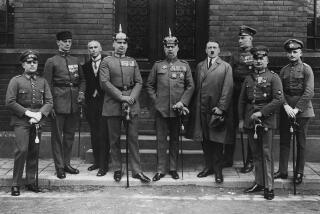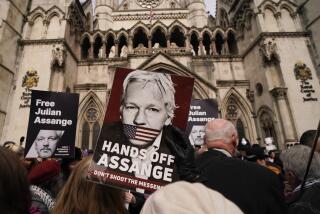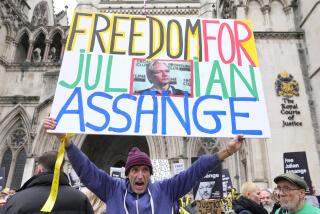British Let Case to Extradite Pinochet Move Forward
LONDON — The British government decided Wednesday that former Chilean dictator Augusto Pinochet is fit to stand trial and must stay in Britain to face extradition proceedings on charges of torture, kidnapping and other crimes against humanity brought by a Spanish judge.
The decision by Home Secretary Jack Straw, the country’s top law enforcement official, triggered a furor of protest from the Chilean government, which recalled its ambassador in protest, and from the powerful Chilean army.
Pinochet’s lawyers are expected to challenge the decision, and legal wrangling over the fate of the retired general could drag on for months, if not years.
But Straw’s ruling opened the way for the 83-year-old Pinochet to make his first court appearance in connection with the deaths or disappearances of more than 3,000 people during his 17-year regime, which ended in 1990.
Straw ruled that courts should proceed with the Spanish request for Pinochet’s extradition on charges including attempted murder, conspiracy to commit murder and torture. But Straw said the request relating to crimes of genocide and murder did not meet British legal requirements for extradition.
“The Spanish request for his extradition will now be considered by the courts,” Straw said in a five-page statement explaining his decision.
Pinochet is scheduled to attend a hearing Friday at the maximum-security Belmarsh Magistrates Court in southeast London, which has been a regular venue for suspected Irish Republican Army terrorists and other high-risk prisoners.
The government said the hearing was moved from central London to the courthouse, which is attached to Belmarsh Prison, to ensure public safety and minimize the disruption to other court business.
Pinochet, who has not been seen in public since his arrest, remained holed up in the mansion that has been rented for him at Wentworth, an exclusive estate about 20 miles west of London. However, others came to his defense.
In its condemnation of the British decision, Chile’s military included a veiled attack on Chileans who have supported the prosecution of Pinochet and reflected impatience with the Chilean government’s unsuccessful diplomatic campaign to win the former dictator’s freedom.
The unstated targets of the army communique were apparently leftist leaders such as Juan Pablo Letelier, a congressional deputy whose father was assassinated by the dictatorship’s operatives in Washington, D.C., and other politicians who have been excoriated by rightists for traveling to London to aid the prosecution.
“The efforts of the [Chilean] government so far have not achieved their objectives, partly because of the attitude of people who, with numerous acts in and out of Chile, have interfered with the effort,” the statement said. Although Pinochet allies and former military commanders have made ominous statements in recent weeks about the potential for violence in Chile, so far the military’s conduct has been notably disciplined. Most political observers believe that there is no danger of a military uprising in Chile now.
In London, Straw was cheered Wednesday night in the House of Commons by fellow Labor Party members, and human rights lawyers hailed his findings. Chilean exiles danced in the street. Opposition politicians charged that Straw’s decision was politically motivated.
Former Conservative Prime Minister Margaret Thatcher said Straw had made a “grave mistake.”
“He had ample power to put an end to this shameful and damaging episode. He has chosen instead to prolong it,” said Thatcher, who entertained Pinochet for tea shortly before his Oct. 16 detention. “Neither he nor the government can hide behind legal posturing. This was a political decision.”
Before issuing his judgment, Straw reviewed submissions from Pinochet’s attorneys, the Chilean and Spanish governments, human rights lawyers, the British Foreign Office, victims of police torture during the dictator’s reign and many others.
Straw rejected requests to release Pinochet on humanitarian grounds, saying that “it does not appear that [Pinochet] is unfit to stand trial” and that “it would not be unjust or oppressive” for him to do so.
He did, however, leave this avenue open, saying that humanitarian issues could be reexamined in light of any developments.
Pinochet was arrested on a Spanish warrant at a London clinic where he was recovering from back surgery. The case was initiated by Spanish Judge Baltasar Garzon, who initially cited 94 Spanish victims as the basis for the request but has since broadened his warrant.
Pinochet fought the extradition request on grounds that he was entitled to immunity as a former head of state. Britain’s highest court rejected that argument two weeks ago in a landmark decision for international law.
It then fell to Straw to decide whether there were any exceptional reasons for halting the proceedings and sending Pinochet home.
Human rights lawyers lauded Straw’s findings, as they did the Nov. 25 ruling by the House of Lords tribunal.
Chilean officialdom, however, reacted angrily to the decision.
Chilean Interior Minister Raul Troncoso, who is acting as vice president while President Eduardo Frei attends a conference in Brazil, announced that Chile was summoning home Ambassador Mario Artaza for “consultation,” an act of diplomatic protest.
Pinochet’s lawyers could apply to a judge today for an emergency review of Straw’s decision on grounds that it is legally flawed. If they do not, or if that judicial review is rejected, the Belmarsh Magistrates Court will hear the case.
Whatever decision the Belmarsh court were to make undoubtedly would be challenged by the losing side in the High Court and again in the House of Lords.
*
Miller reported from London and Rotella from Buenos Aires.
More to Read
Sign up for Essential California
The most important California stories and recommendations in your inbox every morning.
You may occasionally receive promotional content from the Los Angeles Times.










